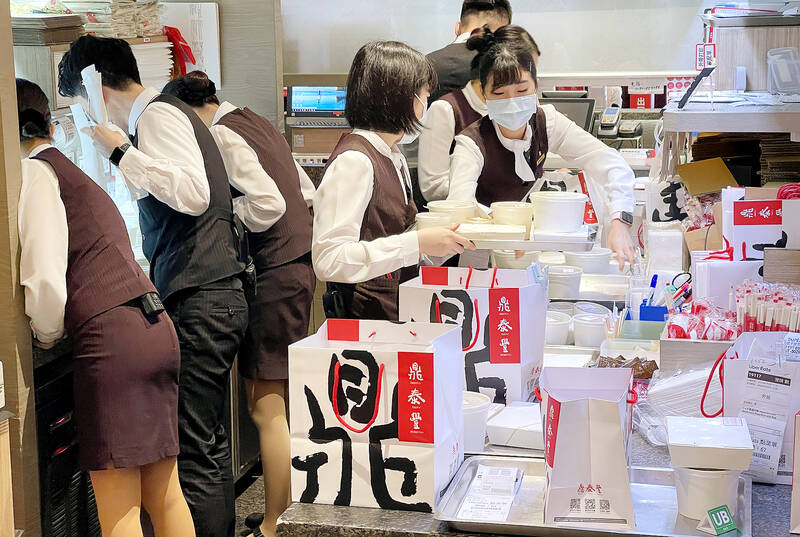Retail sales and food and beverage sector revenue last month hit single-month highs, the Ministry of Economic Affairs (MOEA) said on Thursday.
Retail sales for last month totaled NT$408.2 billion (US$13.49 billion), an increase of 4.2 percent from a year earlier, while sales posted by the food and beverage sector totaled NT$99.5 billion, up 31.2 percent, ministry data showed.
However, sales of wholesale items last month totaled NT$915.7 billion, down 18.4 percent from a year earlier, the ministry said.

Photo: CNA
The decline in wholesale business was mainly caused by weak external demand and inventory adjustments by customers, MOEA’s Department of Statistics deputy director Huang Wei-chieh (黃偉傑) said.
As such, wholesale sales of machinery and equipment, building materials, chemicals and household appliances dropped 19.1 percent, 28.4 percent, 31.9 percent and 22.7 percent respectively from a year earlier, Huang said.
Growth in retail business was backed by peak consumer spending ahead of the Lunar New Year holiday, coupled with easing of COVID-19 restrictions, which facilitated a rise in demand for travel and shopping.
This upward trend was also reflected in the food and beverage sector, as it benefited from companies organizing year-end banquets, while families also dined out more during the holiday period last month.
With the government set to issue a cash subsidy of NT$6,000 to Taiwanese and eligible foreign nationals, the retail and catering sectors are expected to post steady growth this year, Huang said.
The economic growth rate is estimated to rise by 0.35 to 0.45 percentage points after the cash handout, which is expected in April, he said.
Commenting on government plans to issue vouchers worth NT$5,000 to visitors to help boost the tourism sector, Huang said such payments would help stimulate the retail and catering sectors, but its effect would not be reflected in GDP.
A slowdown in global consumer demand and inventory adjustments in the industrial supply chain mean the wholesale sector’s downward trend would continue, he added.

NEW IDENTITY: Known for its software, India has expanded into hardware, with its semiconductor industry growing from US$38bn in 2023 to US$45bn to US$50bn India on Saturday inaugurated its first semiconductor assembly and test facility, a milestone in the government’s push to reduce dependence on foreign chipmakers and stake a claim in a sector dominated by China. Indian Prime Minister Narendra Modi opened US firm Micron Technology Inc’s semiconductor assembly, test and packaging unit in his home state of Gujarat, hailing the “dawn of a new era” for India’s technology ambitions. “When young Indians look back in the future, they will see this decade as the turning point in our tech future,” Modi told the event, which was broadcast on his YouTube channel. The plant would convert

‘SEISMIC SHIFT’: The researcher forecast there would be about 1.1 billion mobile shipments this year, down from 1.26 billion the prior year and erasing years of gains The global smartphone market is expected to contract 12.9 percent this year due to the unprecedented memorychip shortage, marking “a crisis like no other,” researcher International Data Corp (IDC) said. The new forecast, a dramatic revision down from earlier estimates, gives the latest accounting of the ongoing memory crunch that is affecting every corner of the electronics industry. The demand for advanced memory to power artificial intelligence (AI) tasks has drained global supply until well into next year and jeopardizes the business model of many smartphone makers. IDC forecast about 1.1 billion mobile shipments this year, down from 1.26 billion the prior

People stand in a Pokemon store in Tokyo on Thursday. One of the world highest-grossing franchises is celebrated its 30th anniversary yesterday.

Zimbabwe’s ban on raw lithium exports is forcing Chinese miners to rethink their strategy, speeding up plans to process the metal locally instead of shipping it to China’s vast rechargeable battery industry. The country is Africa’s largest lithium producer and has one of the world’s largest reserves, according to the US Geological Survey (USGS). Zimbabwe already banned the export of lithium ore in 2022 and last year announced it would halt exports of lithium concentrates from January next year. However, on Wednesday it imposed the ban with immediate effect, leaving unclear what the lithium mining sector would do in the